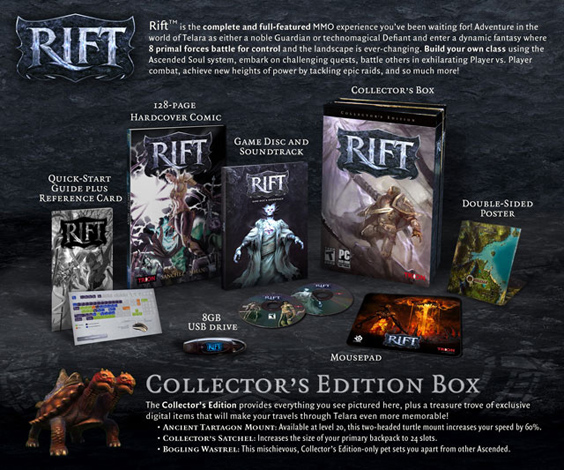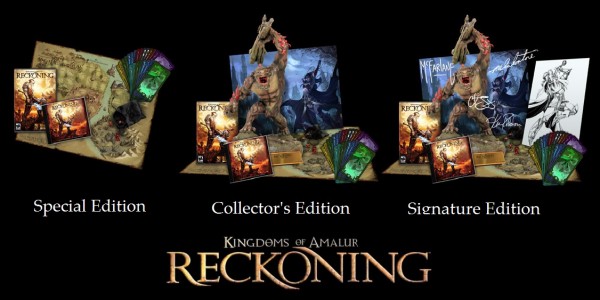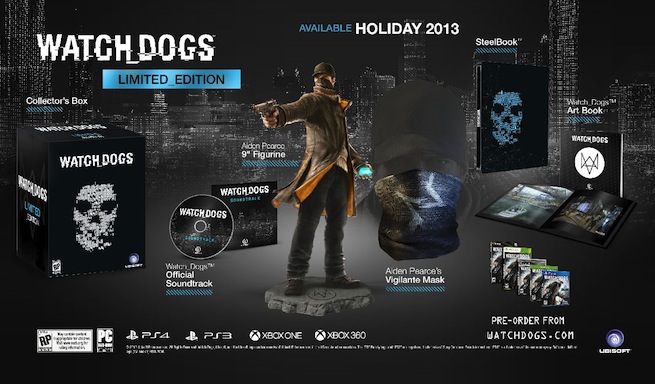Whatever you call them — special, limited, elite, premium — the “game that comes with other stuff” is here to stay. Increasingly, developers and publishers are asking players the following question: “Why just buy a game when you can buy a game, a soundtrack, a statue, a shirt, a keychain, and some stickers, all inside of a special box you can’t get anywhere else?” And recently, they’re even offering superfan editions for new franchises that can’t possibly have superfans yet.
A while ago, we counted down the 18 most expensive special editions ever created (at that time, anyway). Seventeen of the bundles on that list were from established franchises — four of them were from developer Capcom’s Resident Evil series of survival-horror games. But one stood alone. The “Signature Edition” of the now-defunct 38 Studios’ Kingdoms of Amalur: Reckoning was the sixth most expensive game on that list, and it was the only one that wasn’t a sequel.
This year alone, we’re going to see at least three brand-new properties, like Watch Dogs’ $130 Limited Edition above, receive the big-box treatment, and this got us to thinking: Why would gamers throw down more than twice the normal price for a game in an unproven series? And how do developers and publishers go about creating these versions if they don’t know what’s going to interest people yet?
Let’s start with the people who make these things.
The publishers
We wouldn’t have extra-bonus versions of games if developers, publishers, and their respective marketing departments didn’t think they could sell them, so we reached out via e-mail to a couple developers who have put out first-go bonus boxes to see what the process was like. First up: Dennis Lee, publisher Namco Bandai’s director of marketing. He’s one of the people who brought us the Wizard’s Edition for developer Level 5’s PlayStation 3-exclusive role-playing game, Ni No Kuni: Wrath of the White Witch.
“There’s definitely higher risk involved with offering a special edition for an untested franchise,” Lee told GamesBeat over e-mail. “But this is where community and social media can help by giving us a barometer of how excited gamers are for a new gaming property. There’s also a fair amount of industry experience that plays into making the correct call, and being a gamer myself helps the decision-making process as well.”
As far as what to include in the special edition: “You want to offer something compelling that makes sense for the game and which fans are going to talk about and love. We look at the essence of a title and see what stands out, and then we see which items can be created based upon that essence, be it a character, a weapon, or showing off content like artwork or the music that’s in the game.”
Ni No Kuni’s Wizard’s Edition included a full-size replica of the in-game spell book, and it proved so popular that the publisher oversold presells. That didn’t stop one ingenious fan from making his own from scratch, so it looks like that one went over alright.
We also heard from Jim Butler, the director of global brand for Trion Worlds. Its massively multiplayer online role-playing game Rift launched with a Collector’s Edition that included, among other things, a 128-page comic book and an 8GB game-branded USB drive.
“The first thing you have to accept as a marketer is that there’s never a guaranteed thing; even successful franchises have follow-ups that fail,” Butler said. “We take a look at core features that are of interest to consumers and build offerings around them. Sometimes, that means we have multiple offerings — Standard, Deluxe, Collector’s, etc. — and other times, it just means a single offering of awesomeness. The consumer is the primary driver of everything we do.
“We have secondary drivers, of course. Walmart might want something special for their stores that consumers can’t get anywhere else. For Rift, we created the Shambler Pet as an exclusive offering to Walmart customers.”

Above: The Collector’s Edition Box for Rift.
And how do they decide what to give players?
“For digital products, it’s mostly about creating a value package for hardcore gamers that want to go ‘all-in’ on the game,” Butler continued. “For Collector’s Editions that are shipped to retail, there are additional considerations. How long is the production lead time? How much does it weigh? How much does it cost? Is this something that gamers are going to put next to their computer/console and think about the title all the time? How much use/value will this item bring to them?
“If a game has a unique art style, then an art book might be in order. Iconic monsters might warrant a statue. USB, mouse, keyboard … the list goes on and on. And while we’re all gamers and like to think we know what regular gamers want, we also do market research to find out what additions would be most valuable.”
The fans
So, once marketing has done its research and decided what to put in the increasingly large boxes, the final test begins: Will people actually buy the thing?
I posted an inquiry at both Ubisoft’s official Watch Dogs forum and the more general discussion area at CollectorsEdition, a site that’s all about the curation and discussion of video game special editions. I singled out Watch Dogs in both places and asked if anyone was interested in buying it, and if so, why.

Above: Watch Dogs’ Special Editions include a statue of antihero Aiden Pearce, even though fans know next to nothing about him.
For some gamers planning to buy the special edition, it was just enough that Watch Dogs looks really cool.
“I love the art direction. The special edition comes with an 80 page artbook,” said JMG9519, a member of the Watch Dogs forum.
Others are interested out of habit.
“I collect steelbooks, artbooks, and statues,” said FP X Snubkiller on the Watch Dogs forum, “so it’s a must-buy for me.”
Some have practical reasons.
“I don’t want to have to buy the downloadable content or bonus missions later on,” said Watch Dogs forum user Ghost_Rider2008. “I want to be able to play them the minute I find them in the game.”
And some, like CollectorsEdition member vhal_x, are completionists.
“I am getting multiple editions of Watch Dogs. I really like the look of the game, so it is highly unlikely I will not enjoy it. However, if you were to buy an edition and you really hated the game, you could always sell it afterward. This isn’t an option for me, however; even if I dislike something, I have a weird aversion to selling my stuff. Also, it is rare for me to hate a game.”
Developer and publisher loyalty also factors in; some gamers are on board just because the makers of a new project have a good pedigree.

Above: At $275, Kingdoms of Amalur: Reckoning’s Signature Edition was the most expensive special version of a new series we’ve seen.
“I would’ve bought the standard if I had to,” said CollectorsEdition user Harlequin, “but I support the game and its publishers enough that I want to pay as much as I can for a game that looks this good.”
“Based on their track record, I predict the worst Watch Dogs can be is an Assassin’s Creed clone with a modern skin to it,” adds user Tubigdomo. “But based on gameplay videos, it has several unique gameplay features — like the hacking mechanics — to differentiate it as its own game.
“Obviously, the final quality of the game is yet to be revealed, but I have enough evidence to say that it’s more than blind faith why I invest more money in one game. It’s like how you would judge a favorite between two boxers based on their previous matches.
“And what if I don’t enjoy the game? Preordering is a risky venture. It is satisfying when the game you paid $98 for you is good, but it feels even better when that fun game came with extra goodies you are proud to have.”
So what did we learn?
For developers and publishers, special editions are a means to promote player interaction and build up excitement about their new titles. Even if we don’t know much about the game in question, they hope to build interest by offering things they think fans will find useful or cool, and they use social media and forums to gauge what people might want.

Above: We’re not sure which social media led Capcom to believe that fans wanted to spend over $1,300 for a jacket.
Let’s face it, too — special editions are also an opportunity to drive up revenue for a new franchise and hopefully give it a kickstart up front. I contacted NPD, which tracks video-game sales, to see how well the limited versions sell against the standard-issue ones, but it couldn’t tell me much: “Of the top 20 video games sold through retail during 2012 that contained special editions, there was a range of 1 percent to 14 percent of total units sales that stemmed from special edition SKUs,” NPD analyst Liam Callahan told GamesBeat over e-mail.
It’s hard to tell from that whether or not special editions represent a significant portion of sales, but the fact that developers and publishers still offer them, even for brand-new series, at least suggests that it’s worth it.
Fans have their own reasons for buying more expensive versions of games with which they have little to no history. If it looks cool, or they like the people who make it, or they’re just collectors, they’ll pay up. And if PR and publishers have done their homework and can offer fans something they can’t resist, so much the better for everyone.
So while it still seems a little strange to me for someone to pay $130 for Watch Dogs without knowing if it’s good or not, the fans have their reasons, and of course nothing is stopping us from just paying the regular price and leaving the statues and soundtracks on the shelf.
VentureBeat's mission is to be a digital town square for technical decision-makers to gain knowledge about transformative enterprise technology and transact. Learn More


